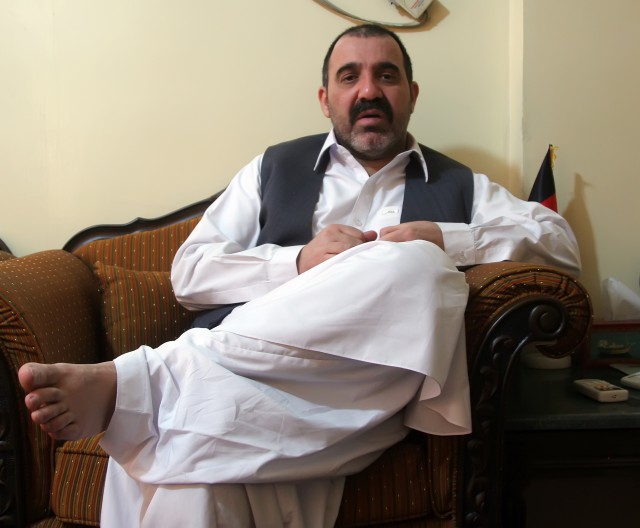
KABUL, Afghanistan — Ahmed Wali Karzai, the younger
half brother of President Hamid Karzai and one of the most powerful men
in Afghanistan, was assassinated Tuesday at his residence in Kandahar,
the family’s hometown.
President Karzai confirmed the killing, which
officials in Kandahar said was carried out by a Karzai family associate
who ran several checkpoints around Ahmed Wali Karzai’s home.
The killing sent shock waves through the Afghan
political system and renewed questions about how secure a country the
U.S.-led mission will leave behind. It also amounted to a major blow to
President Karzai himself, who relied heavily on his half brother as the
key power broker in insurgent- and drug-riddled southern Afghanistan,
the heartland of the Taliban.
The younger Karzai was a highly controversial figure,
long accused of being a major player in the Afghan drug trade, and had
survived several previous assassination attempts. He provided the family
muscle in Kandahar, the most politically important province outside
Kabul, and his death was likely to create a major power struggle that
could result in more violence.
The motive for the assassination wasn’t immediately
clear. A Taliban spokesman claimed responsibility for the killing,
calling the assailant “our infiltrator,” but some observers cast doubt
on the claim.
President Karzai announced his half brother’s death
at the beginning of a news conference in Kabul with French President
Nicolas Sarkozy.
“This is the life of Afghan people. This sorrow is in
every Afghan home. Every one of us has this sorrow,” said Karzai, who
traveled to Kandahar later Tuesday to attend his half brother’s funeral,
accompanied by other government officials.
The American commander in Afghanistan, Gen. David
Petraeus, extended his “personal sympathy and condolences” to President
Karzai in a statement issued by the International Security Assistance
Force.
“President Karzai is working to create a stronger,
more secure Afghanistan, and for such a tragic event to happen to
someone within his own family is unfathomable,” Petraeus said. “I
strongly condemn the actions by anyone who played a role in this murder.
ISAF will support the Afghan government in every possible way to bring
to justice those involved in the murder of Ahmed Wali Karzai.”
Ahmed Wali Karzai, often known by his initials, was
the head of the Kandahar provincial council, but he wielded much more
power than that title indicates. He often was accused of corruption and
being a major drug trafficker, charges he dismissed as “politically
motivated.” In a recent interview with the BBC, he said “no one has
produced any evidence” to back allegations of drug smuggling.
In 2009, he threatened a McClatchy Newspapers
reporter who questioned him in Kandahar about the drug allegations,
saying, “Get the (expletive) out before I kick your (expletive).”
He also was said to have long been on the CIA
payroll, which caused friction within Washington, as the State
Department was critical of his links to criminal activity. His personal
militia, the Kandahar Strike Force, was implicated in the assassination
of a former Kandahar police chief and prosecutor.
Gen. Abdul Razik, the police chief in Kandahar, said
at a news conference that the killer was “one of (Ahmed Wali Karzai’s)
trusted men” and had been working with him for the past seven years.
“His friends and comrades have been arrested and we
will interrogate them,” said Razik, who alleged that “some foreign hands
were involved in the assassination plot.”
Haji Agha Lalai, a member of the Kandahar provincial
council who was with the younger Karzai at the time of his killing, told
McClatchy that it happened at 11 a.m. in Karzai’s own house, where he
was receiving business, political and personal contacts as he regularly
did.
“He (Karzai) entered another room. He and the killer
were the only ones in that room. I heard firing,” Lalai said. “The
killer was one of his security guys.”
According to Lalai, the assassin was 25 years old and
from Dand district, just outside Kandahar city. Unconfirmed news
reports identified him as Sardar Mohammed and said that he’d worked
previously as a bodyguard for President Karzai’s older brother, Qayum
Karzai.
A doctor at Mirwais Hospital in Kandahar said that
Ahmed Wali Karzai had been shot twice at point-blank range, once in the
chest and once in the skull. He was dead on arrival at the hospital,
said the doctor, who requested anonymity because he wasn’t authorized to
speak to the news media.
Tooryalai Wesa, the governor of Kandahar, whose power
paled in comparison with Ahmed Wali Karzai’s, said at a news
conference, “He was serving the people of Kandahar. He didn’t spare any
efforts in bringing security and stability to Kandahar.”
———
(c) 2011, McClatchy-Tribune Information Services.
Visit the McClatchy Washington Bureau on the World Wide Web at www.mcclatchydc.com.













